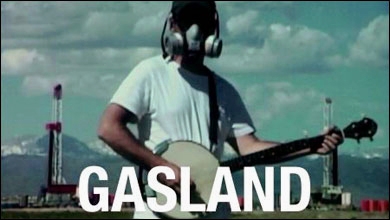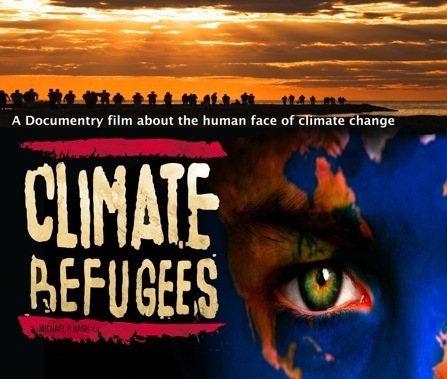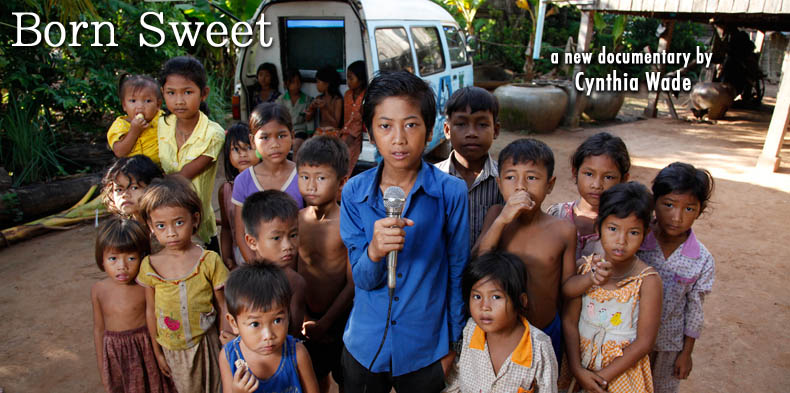The Sundance Film Festival has long been a celebrated venue for environmental documentaries, due in part to Sundance founder Robert Redford‘s green sensibilities. An Inconvenient Truth, The Cove, and Who Killed the Electric Car? all attracted critical buzz at Sundance before they made their way into theaters around the country. The festival’s 2010 lineup continues this trend with a handful of well-crafted, compelling films that address crucial environmental themes not yet in the public consciousness.
Gasland
 Avant garde filmmaker Josh Fox grew up in Pennsylvania on a pastoral stretch of the Delaware River, which happens to sit on the natural gas-rich Marcellus shale formation. When he got a $100,000 offer to lease his property for natural-gas exploration, Fox felt compelled to chronicle the impact that the natural gas-extraction process known as hydraulic fracturing has had on the American landscape.
Avant garde filmmaker Josh Fox grew up in Pennsylvania on a pastoral stretch of the Delaware River, which happens to sit on the natural gas-rich Marcellus shale formation. When he got a $100,000 offer to lease his property for natural-gas exploration, Fox felt compelled to chronicle the impact that the natural gas-extraction process known as hydraulic fracturing has had on the American landscape.
Gasland begins by deftly explaining the complicated practice of hydrofracking, which involves injecting toxic chemicals into the ground — often not far from drinking-water sources — to force natural gas to the surface. This allows the film’s central theme to emerge: that average Americans are under siege from toxic water and air contamination while cavalier energy executives brush aside their concerns.
With his untraditional filmmaking background, Fox elevates the often-dry conventions of environmental documentaries into a persuasive, mood-driven piece. But this is no art film. Fox travels across 25 states, including the drill-punctured lands of Colorado and Texas, to document the debilitating health effects endured by people who have had the misfortune of living near natural-gas wells.
Gasland‘s subjects aren’t crunchy types ensconced in eco-conscious enclaves like Boulder. Most are rural families and ranchers who could easily have cast a McCain vote in the last election. Yet they seethe at an unsympathetic natural-gas industry that clings to the eroding notion that its product is safe and environmentally friendly, and that fights tooth and nail to protect its Bush-era exemption from the Safe Drinking Water Act.
And then there’s the flammable tap water. In one home after another, Fox and his subjects put lighters to faucets to show how sloppy drilling has let gas leak directly into drinking water. The pyrotechnic parlor trick is good cinema; combined with images of endless parades of heavy trucks to and from drill sites, it makes the visually quantifiable point that the natural-gas industry has engaged in a rabid, decade-long expansion without much thought to the consequences.
Fox is hopeful that a distribution deal is imminent for Gasland. Robert Koehler’s swooning review in Variety — which says Gasland is so “potent” that it could be the rare film that forces social change — could help make studio distribution a reality. At Monday night’s screening at Sundance, Fox was greeted by a roaring crowd and choked-up audience members during the Q&A session. If that’s any indication, the future of Gasland is as bright as flaming tap water.
See the flammable tap water:
—–
Climate Refugees
 Director Michael Nash’s alarming documentary, which details the impact that a billion humans displaced by climate change will have on global security, should goose even the most fervent climate deniers into reconsidering their positions. Nash uses lush cinematography and first-person accounts to chronicle hellish experiences of displacement caused by increasingly severe weather-related events like the ones expected to be triggered by global warming.
Director Michael Nash’s alarming documentary, which details the impact that a billion humans displaced by climate change will have on global security, should goose even the most fervent climate deniers into reconsidering their positions. Nash uses lush cinematography and first-person accounts to chronicle hellish experiences of displacement caused by increasingly severe weather-related events like the ones expected to be triggered by global warming.
Climate Refugees begins with the tiny sliver of Polynesian islands that make up the country of Tuvalu. Tuvalu is expected to be the first sovereign nation to become a casualty of rising sea levels. This raises a central question of the film: What happens to the political identity of people when their country no longer exists? In a world of tightly controlled national borders, climate refugees have many more barriers to relocation than political refugees.
And what will happen when larger groups, in the hundreds of thousands or even millions, are displaced and have no country in which to relocate? Will they pour over borders and destabilize already shaky governments in Asia and the South Pacific?
When the film pivots from the recent Bangladesh cyclone to the U.S. disasters of Hurricanes Katrina and Ike, it makes the point that America is also in deep danger from displaced refugees. Crime rates have spiked in towns and cities where Katrina survivors relocated. Viewed in the context of tens of millions of refugees potentially rushing our border from the South, our current immigration problems seem trivial.
The film alternates between heart-wrenching accounts of survivors of climate disasters all over the globe and interviews with leading environmental experts such as Lester Brown. Political leaders like Sen. John Kerry and former House Speaker Newt Gingrich also provide insight and commentary, with Gingrich saying he became concerned about climate change in part because the U.S. military has warned that the phenomenon threatens to become a serious destabilizing force around the world.
Climate Refugees doesn’t address the causes of climate change, opting not to get bogged down in that distracting debate. But Nash makes a frightening point near the end of the film. If climate change is human-made, we have a chance to head off the global threat of climate refugees. If it’s naturally occurring, we’re screwed.
Watch the trailer:
—–
Born Sweet
 Oscar winner Cynthia Wade’s short film Born Sweet follows Vinh Voeurn, a 15-year-old Cambodian boy suffering from arsenic poisoning. Arsenic occurs naturally in Cambodia’s volcanic soil and has been poisoning Vinh’s village water supply for years, recently causing the death of a young neighbor girl. The arsenic is permanently in Vinh’s system, leaving him anemic and with ugly dark spots on his body. Yet in this moving but hopeful short, Vinh comes to terms with his illness and potential mortality, all while nursing the normal teenage hope of meeting a girl.
Oscar winner Cynthia Wade’s short film Born Sweet follows Vinh Voeurn, a 15-year-old Cambodian boy suffering from arsenic poisoning. Arsenic occurs naturally in Cambodia’s volcanic soil and has been poisoning Vinh’s village water supply for years, recently causing the death of a young neighbor girl. The arsenic is permanently in Vinh’s system, leaving him anemic and with ugly dark spots on his body. Yet in this moving but hopeful short, Vinh comes to terms with his illness and potential mortality, all while nursing the normal teenage hope of meeting a girl.
In Vinh’s village, the main source of entertainment is singing along with Cambodian karaoke music videos, and Vinh dreams of escaping his desperate future with a career as a karaoke performer. When aid workers connect Vinh with karaoke video producers in order to make an arsenic PSA, his life changes in a way he and his family could never have imagined.
—–
And two more worth a mention: Mark Lewis introduced a 3-D update of his 1988 comedy/documentary about the misguided introduction of amphibians into Australia, called Cane Toads: The Conquest. And Wasteland, a film by Lucy Walker, shows how Brazilian artists use found objects, in this case from vast garbage landfills, to make inspired creations.


